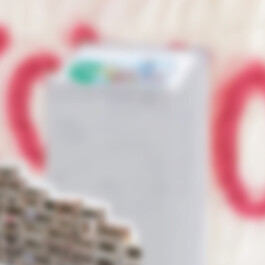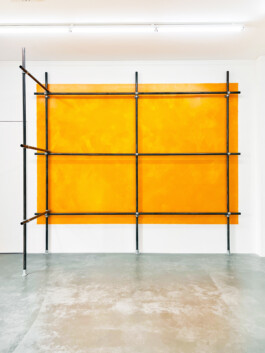Interview mit
Melo Börner
Melo Börner, Artist Talk
Tanja Heuchele: Can you describe yourself in 5 sentences?
Melo Börner: Haha. Is this Tinder or what? OK, I’ll give it a try. I am a queer feminist artist living and working in Berlin since 2018. I make locally sensitive installations, sculptures, performances, and drawings with a focus on queer materiality and corporeality. I also love coffee, cats, and walks in parks.
TH: Your life without art would be…
MB: I would say impossible. I believe there is no life without art. We are surrounded by creative works, like music, design, fashion, film, etc. How could there be a life without art?
TH: What material inspires you the most? And which materials are you working with the most at the moment?
MB: Often my work begins with a drawing, a photograph, a found object, or a paragraph in a book that captures thoughts of mine that I had not been able to grasp. I am most inspired by everyday ‘object situations’. Like a pile of clothes on a chair or randomly arranged things on a pavement.
The Artist, Melo Börner
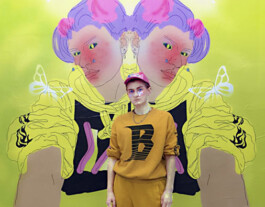
Melo Börner, Artist Talk
TH: Are there also materials that you would never use again?
MB: There are a lot of materials that I have never used! It’s really not easy for me to find a material that I would never use again. The nice thing is that when I have to think of a material that I would no longer use, I immediately begin to think of how I could use it today…
TH: What literature did you study in preparing your art piece(s)?
MB: At the moment I am reading We Need to Talk About Money by Otegha Uwagba, Radikale Zärtlichkeit – Warum Liebe politisch ist (Radical tenderness – Why love is political) by Şeyda Kurt, and All about Love by Bell Hooks.
TH: What is your work about? What is your intention with it? What should it evoke in the viewer’s emotion?
MB: My work is about being in a space, being aware of your own body and your movements. It’s about vulnerability and empowerment. It’s about the Teenage Truth and the alien creature view. It’s about the dirt in your face and the holes in your clothes. I create environments that change notions of spatial and bodily norms, disrupting these concepts through material interventions.
Melo Börner, Exhibition View, 2021
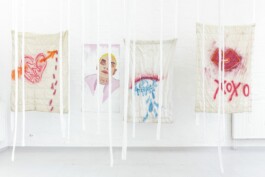
Melo Börner, Artist Talk
TH: When did the journey with Who’s afraid of_Rosa begin for you, and what keeps you involved?
MB: A friend suggested I should be a part of the first exhibition in Leipzig in 2019. I’m very interested in seeing each other’s work in different settings.
TH: How is the collective Who’s afraid of_Rosa organized?
MB: Members of the Künstlerinnennetzwerk Leipzig (Women Artists Network Leipzig) initiated the project and invited guest artists for each show. Upcoming tasks and decisions are discussed in the group and everyone can take as much responsibility as they want and are capable of.
TH: So far, I’ve only met female Rosa’s… can men also be part of it?
MB: The project shows womxn’s perspectives on the themes of the exhibition title. There is more than one non-binary artist involved in the current exhibition. I personally was supported by male-identifying friends. Also, one of the curators is male. So men are a part of it.
TH: What does Rosa Luxemburg mean to you?
MB: For me, she is an important critical-thinking theorist and activist against the capitalist system and its class-based discrimination. I am shocked and horrified whenever I think about her brutal murder and its cover-up.
Melo Börner, Exhibition View, 2021
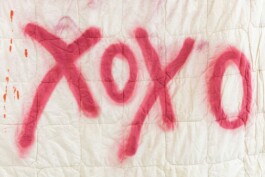
Melo Börner, Artist Talk
TH: The subline of the exhibition is public space – private space – political space. What space do you (not) feel comfortable in? Where would you like to make a difference? What is your perception of space? Is it even the case that the above-mentioned spaces do not exist without each other?
MB: This is a tough question. As we know, we live in a patriarchal system, which means that our environment is shaped according to the needs of (white) men. This runs through all areas of life. So yes, public and private space is also a political space. I feel most comfortable in places that address this issue and experiment with the possibilities of queer feminist organising. The Pfauenkreativurlaub in the Raumerweiterungshalle was a special project where I felt seen and safe to be. I think we should all think more about the underlying conditions we and others live in.
TH: How do you react to people who are not familiar with art, and how do you think they can be made to understand better?
MB: Fortunately, you don’t have to understand art to enjoy it. When I meet people who are not as interested in art as I am, I usually try to have a conversation about mutual interests or a completely different topic.
TH: What do you enjoy about your life as an artist?
MB: The autonomy to work on issues that interest and concern me.
TH: What is great art for you?
MB: There is a lot of fantastic art out there. At the moment artists inspiring me are my friends Laura Dee Milnes, Philine Kuhn and Anne-Kristin Winzer, to name just three. I’ve also been a big fan of the work of Eva Hesse, Louise Bourgeois and Sarah Lucas for a long time.
TH: What about your next projects, exhibitions? Where can you be seen next?
MB: I am looking forward to an intensive studio period where I can dive deep into my work. I am also planning a riso print booklet with my drawings of alien creatures. See you in 2022!
Siehe auch
Mehr Interviews
